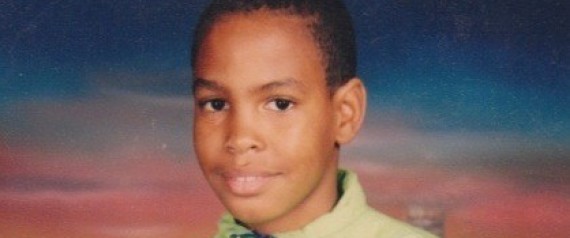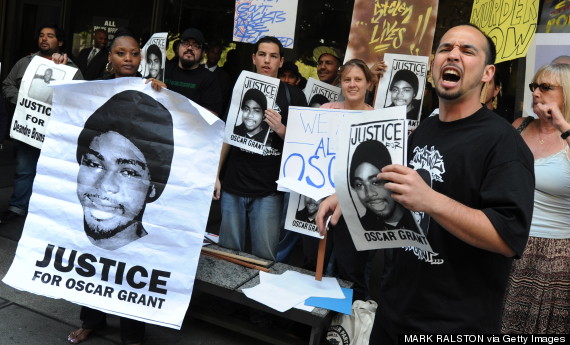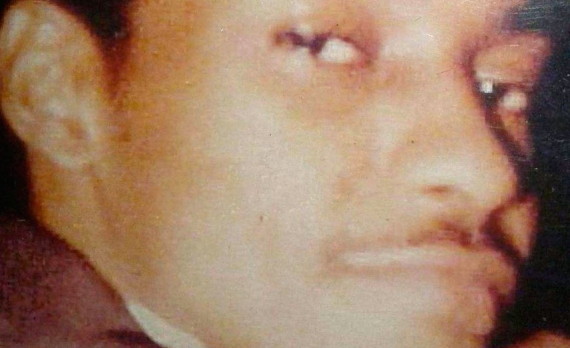THERE MURDERING OUR KIDS AND GETTING AWAY WITH IT
Michael Brown's death in Ferguson, Missouri came as no shock to the hundreds of Americans of color who have lost loved ones in officer-involved shootings. Below, some of these people discuss their experiences and share their thoughts on the grand jury's decision not to indict Darren Wilson, the police officer who fatally shot an unarmed Brown this summer.
Nicholas Heyward Jr.
Thirteen-year-old Nicholas Heyward Jr. was playing "cops and robbers" in the stairwell of a Brooklyn housing project in 1994 when NYPD Officer Brian George mistook the teen's toy rifle for a real weapon. George fired one shot into Nicholas' stomach, killing him.
Then-Brooklyn District Attorney Charles Hynes declined to convene a grand jury in the case, or to directly press charges against George. The shooting was ruled a justifiable homicide.
Twenty years later, Nicholas' father, Nicholas Heyward Sr., is still fighting to keep the memory of his son alive. He's distraught by both the recent death of Akai Gurley -- another unarmed black male shot and killed by a police officer in the stairwell of a Brooklyn housing project -- and the grand jury's decision in Ferguson. Heyward spoke to The Huffington Post by phone this week. It was clear from his voice that he was close to weeping.

HEYWARD: Honestly speaking, whenever I hear of an innocent victim being killed by the police, I'm in tears. It hurts me so much. I know the officers aren't going to ever be held accountable.
Here's what I would say to [Michael Brown's] family: "Just continue to speak out and expose the truth."
My son was an outstanding student, an outstanding child, very helpful around the house. When my son was alive, in this community, he'd be talking to senior citizens on a bench out here. He was always willing to suck in knowledge from the adults. I remember when I went up to open house at school one night, when we both walked through the door, the principal pointed to my son and said "He's always in my office," and I was like, "What you been up to?!"
But then principal said, "No, he helps me out. He's an outstanding student." I was so overwhelmed by that. He was an amazing kid. I don't just say that because he's my son, but what others have told me about my son also.
My experience has been to organize with those who can identify my pain. You have to talk about that pain, because it's never gonna go away. As the years go on, it gets worse, because you see that it's constantly, constantly happening. You don't want another family to experience the pain and hurt.
That's why I'm still out here 20 years later. They're murdering our kids and they're getting away with it too much. I haven't done enough out here because they're still killing our children. And until that stops, I won't stop.
Sean Bell
This Tuesday marked eight years since Sean Bell, 23, was killed by a hail of NYPD bullets in Queens. He was unarmed. Later that day, he was supposed to get married.
The three officers who faced charges were eventually acquitted. On Monday night, Bell's mother Valerie watched the announcement of the Ferguson grand jury decision. She shared her thoughts with HuffPost the following day.

BELL: Yes, I watched it. And I really had no words at the time. All I could say was "wow."
I texted Michael Brown's mother before the decision. I said, "Keep your head up no matter what the decision is, because you gotta be the voice for your son."
[Tuesday] is the anniversary of my son's death. It's like it's happening all over again. Seeing [Michael Brown's family], I'm reliving it again with somebody else. Even though they did indict [the officers who killed] my son, the officers still get off. It's a never-ending story.
I'd tell the Brown family this: You're never gonna forget it. If I was at work today, I'd be at my desk, crying.
You have to try to help make change. These police officers need to be held accountable. They need to go to jail. If we did the same thing as them, we'd go to jail for life.
Oscar Grant
Oscar Grant III, an unarmed 22-year-old, was shot and killed in Oakland, California, by BART Officer Johannes Mehserle in 2009. Mehserle said he thought he was using his Taser when he shot Grant point-blank in the back with a handgun.
Multiple witnesses recorded the incident on their phones, and the tragedy was later the subject of an acclaimed movie, 2013's "Fruitvale Station," named for the BART station where the shooting occurred. Mehserle was found guilty of involuntary manslaughter in 2010.
Grant's mother, Wanda Johnson, spoke to HuffPost by phone.

JOHNSON: When the [Ferguson] verdict was rendered, it brought back a lot of memories of going through trial and court for my son’s case.
I don’t think I’m ever going to have that closure. But I believe that Oscar died for a purpose, and one of those purposes was to bring light to the injustice that African-American and brown young men face.
And so with that, every day is an opening for me, because I’m still always talking about Oscar, always sharing the experience that I went through, that my family went through, and working to try to let people know that stereotypes still exist.
People expect you to just get over it in a certain amount of time. One of the things that helped me to cope is being able to help other mothers or families who have lost their children to gun violence. It’s an everyday struggle. I go through the transition of not having their child with them, encouraging them. It’s a very hard process to deal with. It’s very hard.
People are fed up. We have a new generation coming up and they see the injustice taking place in our society. They looked at what happened all the way from Rodney King to my son Oscar Grant and now Michael Brown.
[Brown's family] hasn’t had the time to sit down and come to grips with how their family is forever changed. They won’t get to smell the roses that their son brings home. They won’t get to see his smiling face. They won’t get to hear his laugh. They won’t get to hear him say "I love you." They won’t get to feel his hugs and his touch.
One of the things that they will probably have to do is get away to themselves, for awhile, to really process this, and really just come to grips with Michael not being here anymore.
Errol Shaw
Errol Shaw was 39 years old when Detroit police Officer David Krupinski fatally shot him at his home on Aug. 29, 2000. Shaw could not hear or speak, and his family said he couldn't understand police orders to put down the rake he was holding. Shortly after Shaw's death, Detroit's mayor asked for a federal review of the police department and police-involved shootings, resulting in a Department of Justice monitoring program that only ended this year.
Krupinski was charged with manslaughter, but was later acquitted.
Shaw's niece, Katina Crumpton, was there when her uncle was killed. She told HuffPost that the deaths of both Michael Brown and her uncle, along with the lack of a criminal conviction for either shooter, prove that our justice system needs an "overhaul."

CRUMPTON: I was very hurt for [Michael Brown's] family. I can understand the agony, the pain, the sorrow. I understand it all because we've been there.
There's still not a sense of normalcy when it comes to what transpired with my uncle. Each day it's a struggle for his mom, my grandmother.
When I got out of my car, as I was walking towards the police officers, I was kind of stating to them, "He's deaf, he's deaf, he can't hear you." They were telling him to drop his rake, but he was actually going to do yardwork. They told me to stop coming. And then one officer pointed the gun at me and told me to stay right where I was. Otherwise, they probably would have killed me, too.
Now, when I see a police officer, I literally cringe. I get nervous. It's been that way with my entire family and people who know about our case. We have no trust in our judicial system. We have no trust in police officers anymore. It's very, very difficult as a community to move forward if we can't even trust the police to protect and serve.
It's like the judicial system is dehumanizing us as a people. Like we are not a concern. Like we are just not human beings. It's utterly ridiculous how these officers are getting away with these senseless murders.
O'Shaine Evans
O'Shaine Evans, 26, was fatally shot by San Francisco police Officer David Goff on Oct. 7. Goff reportedly suspected that Evans was part of a group of men who'd just burglarized an SUV near AT&T Park. He approached Evans, who was sitting in a parked car, and asked him to show his hands, according to police. Evans allegedly pointed a gun at Goff, who fired into the car, striking Evans twice. Goff is currently on paid leave while the shooting is under review.
Evans' family doubts that Goff properly identified himself, and police admit that Goff's uniform was partially covered.
The decision in Ferguson was exactly what Evans’ sister, Cadine Williams, 34, expected to happen.

WILLIAMS: [Evans] was born in Jamaica, moved here in '92. You know the story. We came here because of poverty. He was trying to be a boxer when they killed him.
Every day I dream about it. I haven’t gone back to work. I’m scared in my own house. We grew up together.
I didn’t expect anything different to come out of [Ferguson]. It was not surprising to me. For them to charge Wilson with murder, that would have been justice.
[The violent protests] should happen. Burn it down. That’s the only way they’re going to listen to us, to see we mean business, that we’re standing up for [Brown]. I was not [active] until [Evans died]. I wish I had gotten out there before this. It’s an eye-opener. It’s a lesson learned.
I’m so sorry for [Michael Brown's family's] loss, and that they have to relive the whole nightmare all over again. I feel it for them, because I know what they’re going through. It’s close to what happened to my brother.
Ramarley Graham
In February 2012, NYPD Officer Richard Haste spotted 18-year-old Ramarley Graham outside a Bronx bodega and reportedly thought he had a gun. Haste and another officer followed Graham back to his apartment.
The officers broke inside without a warrant, and Haste shot Graham once in the chest, killing him. Graham was unarmed, and police say he was trying to flush a bag of marijuana down the toilet. His grandmother and his 6-year-old brother watched him get shot.
Haste was indicted later that year, but the indictment was tossed out on a technicality in 2013. A second grand jury declined to indict him. Graham's mother, Constance Malcolm, talked to HuffPost during a protest in New York City Monday night.

MALCOLM: I got an indictment in Ramarley's case and I'm right back to square one. It’s sad that [the Brown family] didn’t get the indictment.
If it was us, we'd get indicted right away -- before we even got to the precinct.
We're black, and they don’t think our lives matter. But we’re showing them that they do matter. It’s a lot of black youth out here, and it makes a big difference. We're showing that we are somebody. We’ll stand strong, be united as one and never be defeated.
If a cop can kick your door down and murder you, what kind of country are we living in? We can't keep burying our kids. It's just too much for a mother.
Remarks have been edited for length and clarity.
.jpg)
No comments:
Post a Comment